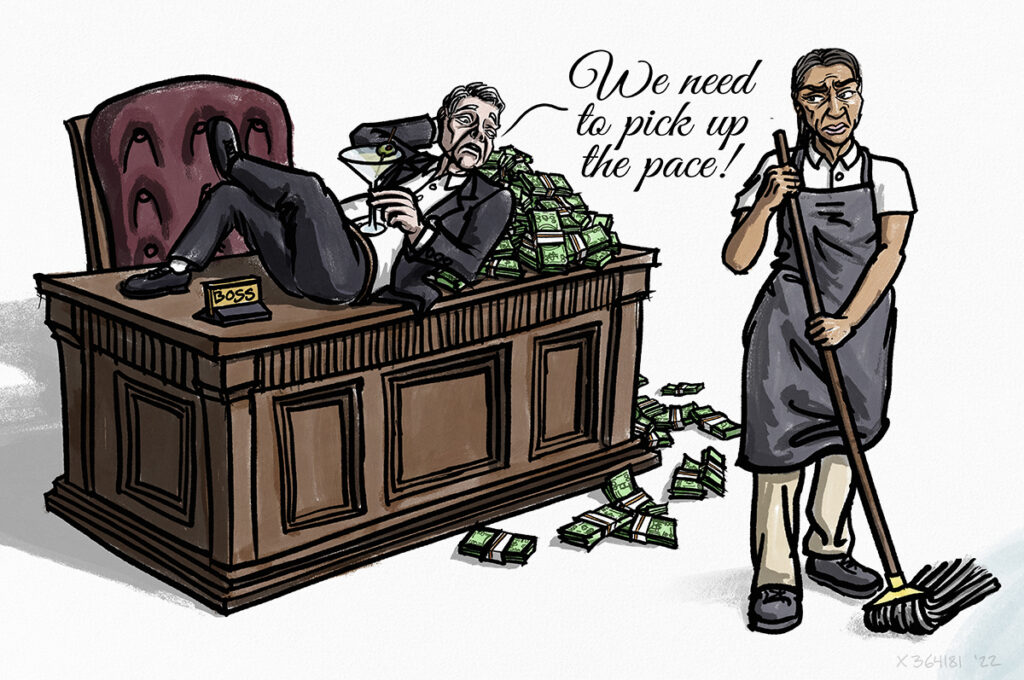
One of my favorite running bits with my coworkers is a joke about the size of the United States Navy. I deliver a variation of the line, “But instead the Navy has 11 nuclear-powered aircraft carrier battle groups,” when someone comments about some social service or benefit that is unavailable in the US but common in other countries. Our management never lets one of these jokes go. Every single time, one of them has to say something about how “we” collectively decided to forgo nationalized healthcare or social services.
But who is “we” and what are they talking about? In my lifetime, I don’t recall any kind of referendum or popular vote on creating a national health service or ending the Iraq War. I have never even been given a performance review by my manager. When my managers say “we” aren’t getting raises or politicians say “we” need to tighten our belts, they hide who really controls the levers of power. While employers have the power to improve working conditions and the government has the power to create social services, they hide that fact by pretending they have as little power over the matter as your average worker.
The implication is somehow that it’s not the fault or responsibility of the state, employers, or other powerful people to provide for the basic needs of everyone else. The buck keeps getting passed round and round until everyone throws up their hands and says, “Well, it’s really everyone’s fault!” Thus, nobody has the agency or power to do anything.
To us workers, this presentation changes how we perceive these material relationships. Instead of seeing that the vast majority of the population slaves away at the whim of the ruling class, we are programmed to believe that there are no classes and power is effusive. Elon Musk is just like you and me.
I see this dynamic all the time in all kinds of settings. Business owners and management get on my nerves the most with the “We’re a team” rhetoric, especially when coupled with a pizza party when workers’ morale is low or an issue arises in the workplace. They’ll understaff the workplace, make you do work you’re not qualified for, or put you in physical danger all while claiming to be just like you – the difference being that you do the work and they rake in the cash.
Nowadays, some bosses don’t even command workers to “Work harder or else,” they approach workers with Personal Improvement Plans to “See how we can meet your potential.” Customers don’t order items off a menu, they say “Let’s go with the rice pudding for dessert,” referring to themselves in the third person plural as if it’s more polite than the alternative. Barack Obama’s famous 2008 election campaign ran the slogan “Yes We Can.” Who is “we”, and what are “we” doing exactly? Did I become President?
It seems to me that people often use the royal “we” when dividing lines are the most obvious, with the intent of preserving a dramatic power differential by masking it. This is especially true when an active power struggle challenges the status quo. Nationalism went hand in hand with outright violent repression of IWW members and other radicals during the First World War, for example.
Today the ruling class’s tactics are less violent but the core remains the same. When workers start to take collective action and fight as a union, management relentlessly push the “We’re a team” line. Suddenly, there are no workers, managers, or owners. There are only partners, team members, and “family.” The boss is just like you and me. Sadly these tactics work very well if the organizing committee has not prepared the workers for them – despite extremely canned and cringe-inducing stuff like this speech given by the owner of the “progressive” vegan food company, No Evil Foods.
On the other hand, the preamble to the Industrial Worker of the World’s constitution unambiguously states that there is an “us” and a “them,” namely, the working class and the employing class. The fight is between labor and capital, the vast majority of us who sell our bodies and minds for wages and the capitalists who get fat off our sweat and blood. These two classes are engaged in a constant struggle, whether knowingly or not.
Our union learned these lessons the hard way. We faced down violent strike-breaking, mass police raids, assassinations, deportations, and more. These days, the employing class’s power has grown to unprecedented levels while the working class’s power has diminished to almost nil. Class consciousness is virtually unheard of in the United States, and workers swim in a sea of “We’re all a team” propaganda.
A difficult task lies ahead of us IWW members. We must cut through the fog of class collaboration and build the fighting union workers need to win our liberation from wage slavery. One of the first tasks is talking to our coworkers to show how clearly the battle lines are already drawn. And ultimately “we,” the workers, will take the fight to “them,” the capitalists. Let’s get to work.
